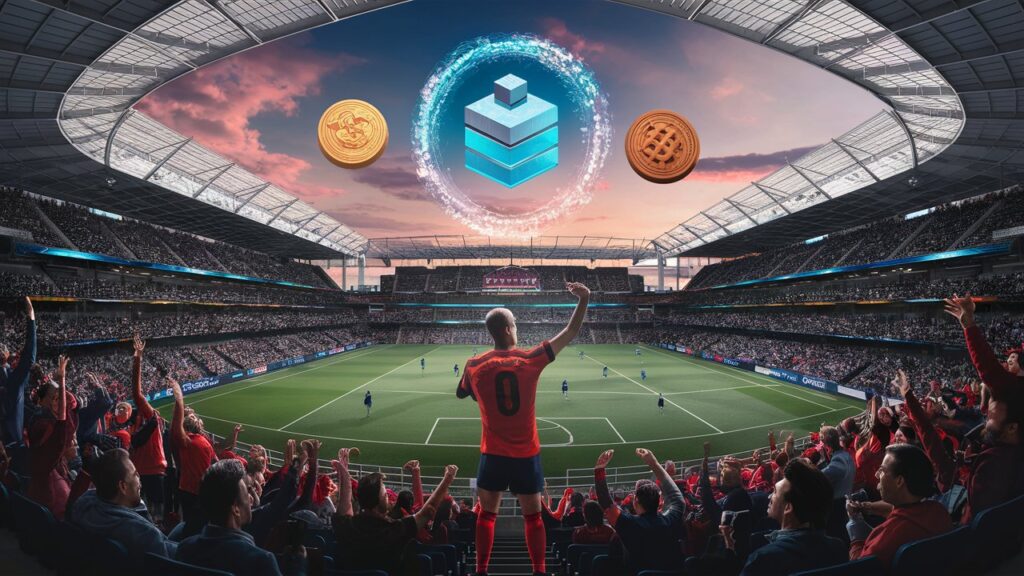The world of sport is constantly evolving, and the search for new technologies to improve the fan experience is a constant. In this sense, Blockchain technology and tokenisation are presented as disruptive tools with the potential to transform the way we interact with sporting events.
How does blockchain technology and tokenisation work in stadiums?
Blockchain technology, also known as blockchain, is a decentralised and immutable digital registry that allows information to be stored and tracked securely and transparently. Tokenisation is the process of converting physical or digital assets into unique and non-transferable digital tokens.
In the stadium context, Blockchain technology and tokenisation can be used to:
- Verify the authenticity of entries: By creating unique and non-transferable digital tokens, it can be guaranteed that each ticket is valid and cannot be counterfeited or duplicated. This helps to combat ticket scalping and protect fans from scams.
- Managing the identity of supporters: Blockchain technology can be used to create a secure digital identity for each fan, allowing stadiums to securely store and manage their personal information. This can be used to offer personalised services, such as digital ticket delivery or payment management.
- Control access to the stadium: Fans' digital identities can be used to control access to the stadium in a secure and efficient way. Fans can use their smartphones or handheld devices to scan their digital tickets and gain access to the stadium without the need to present physical tickets.
- Improve security: Blockchain technology can be used to create a more robust security system for stadiums. For example, it can be used to track the movement of people and objects within the stadium, and to identify potential threats.
- Loyalty programmes: Fans can receive tokens as a reward for their attendance at matches, purchases or participation in club activities. These tokens can be redeemed for exclusive benefits such as discounts on merchandise, VIP tickets or unique experiences.
- Access to exclusive services: The tokens can be used to access exclusive services within the stadium, such as VIP lounges, hospitality areas or dining experiences.
- Club governance: The tokens could be used to give fans voting rights in club decision-making, thus encouraging their active participation in the management of the club.
Benefits of Blockchain technology and tokenisation for stadiums
The implementation of Blockchain technology and tokenisation in stadiums can offer a number of benefits for both fans and event organisers. Among the main benefits are:
- Increased security: Blockchain technology and tokenisation can help improve stadium security by reducing the risk of fraud, counterfeiting and other crimes.
- Better accessibility: Blockchain technology and tokenisation can facilitate access to the stadium for fans by eliminating physical tickets and efficiently managing queues.
- More personalised customer experience: Blockchain technology and tokenisation can be used to offer fans a more personalised experience, such as digital ticket delivery or payment management.
- Increased operational efficiency: Blockchain technology and tokenisation can help event organisers improve operational efficiency by automating tasks and reducing bureaucracy.
- Fan loyalty: Tokenisation can be a powerful tool to build fan loyalty and generate a more engaged community.
- New sources of income: Clubs can generate new revenue streams by selling tokens, creating marketplaces or offering exclusive services to token holders.
Use cases of Blockchain technology and tokenisation in stadiums
Blockchain technology and tokenisation are already being used in some stadiums around the world. For example, the FC Barcelona has used Blockchain technology to create a fan loyalty system, while the Manchester City has used this technology to trace the provenance of its products.
In Spain, the Knaken y OARO is one of the first examples of how Blockchain technology and tokenisation can be used to improve the security and accessibility of stadiums. This pilot project will initially be implemented in two Spanish stadiums, and is expected to be extended to other stadiums in the country in the future.
From the above, we can conclude that blockchain technology and tokenisation have the potential to transform the way we interact with sporting events. These technologies can help improve security, accessibility, customer experience and operational efficiency of stadiums. They can also be a powerful tool for engaging fans and generating new revenue streams for clubs.
As Blockchain technology and tokenisation continue to evolve, we are likely to see even more innovative use cases in the field of sport. It is possible that in the near future Blockchain technology and tokenisation will become indispensable tools for the management of stadiums and the organisation of sporting events.

